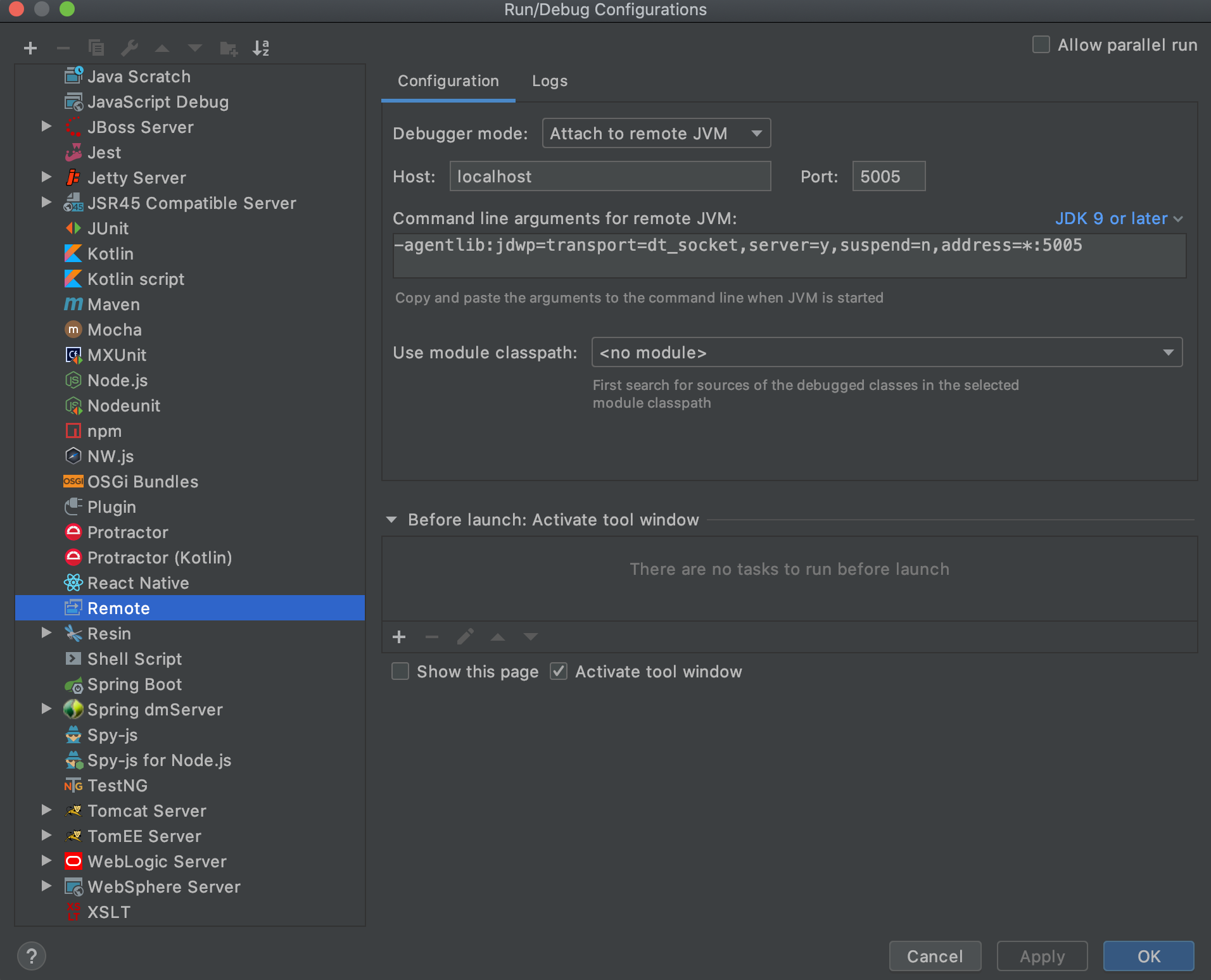Java / Maven / Spring Boot microservice
- Full integration with the latest Spring Framework 2.x: inversion of control, dependency injection, etc.
- Packaging as a single jar with embedded container (tomcat 8)
- Demonstrates how to set up healthcheck, metrics, info, environment, etc. endpoints automatically on a configured port. Inject your own health / metrics info with a few lines of code.
- RESTful service using annotation: supports both XML and JSON request / response
- Exception mapping from application exceptions to the right HTTP response with exception details in the body
- Spring Data Integration with JPA/Hibernate
- CRUD functionality with H2 in-memory data source using Spring Repository pattern
- MockMVC test framework
- Self-documented APIs: Swagger2 using annotations
This application is packaged as a jar which has Tomcat 8 embedded.
- Clone this repository
git clone git@github.com:AndriyKalashnykov/spring-boot-rest-example.git
cd spring-boot-rest-example- Select JDK
sdk install java 18.0.1-tem
sdk use java 18.0.1-tem- Build the project and run the tests by running
mvn clean package- Run the service
mvn clean spring-boot:run -Dspring-boot.run.profiles=default
http://localhost:8080/swagger-ui/#/hotels
http://localhost:8080/actuator/env
http://localhost:8080/actuator/health
http://localhost:8080/actuator/info
http://localhost:8080/actuator/metrics
http://localhost:8080/actuator/configprops
curl -X POST 'http://localhost:8080/v1/hotels' --header 'Content-Type: application/json' --header 'Accept: application/json' --data @hotel.json --stderr -
or
http POST 'http://localhost:8080/v1/hotels' < hotel.json
or
curl -X POST 'http://localhost:8080/v1/hotels' --header 'Content-Type: application/json' --header 'Accept: application/json' -d '{"name":"Beds R Us","description":"Very basic, small rooms but clean","city":"Santa Ana","rating":2}' --stderr -
curl -X GET --silent 'http://localhost:8080/v1/hotels?page=0&size=10' --stderr - 2>&1 | jq .
or
http 'http://localhost:8080/v1/hotels?page=0&size=10'
xdg-open http://localhost:8080/swagger-ui/#/hotels
In order to build image quickly by compiling maven project using host OS maven repo
Build project, artifact will be placed in $PWD/target
cd spring-boot-rest-example
docker run -v ~/.m2:/root/.m2 -v "$PWD":/usr/src -w /usr/src maven:3-jdk-8 mvn clean package
cd spring-boot-rest-example
docker rm -f spring-boot-rest-example
docker build -f Dockerfile.maven-host-cache -t spring-boot-rest-example .
docker rm -f spring-boot-rest-example
docker build -f Dockerfile.maven-multi-stage-layer-cached -t spring-boot-rest-example .
docker run --name spring-boot-rest-example -p 8080:8080 spring-boot-rest-example:latest
curl -X POST 'http://localhost:8080/v1/hotels' --header 'Content-Type: application/json' --header 'Accept: application/json' --data @hotel.json --stderr -
curl -X GET --silent 'http://localhost:8080/v1/hotels?page=0&size=10' --stderr - 2>&1 | jq .
Run the service with these command line options:
mvn spring-boot:run -Drun.jvmArguments="-Xdebug -Xrunjdwp:transport=dt_socket,server=y,suspend=y,address=5005"
or
java -agentlib:jdwp=transport=dt_socket,server=y,suspend=n,address=5005 -Dspring.profiles.active=test -Ddebug -jar target/spring-boot-rest-example-0.0.1.jar
IntelliJ : Run -> Edit configuration -> Remote.
minikube delete --all
minikube start -p minikube --memory=16384 --cpus=6 --disk-size=30g --vm-driver=virtualbox
eval $(minikube docker-env)
eval "$(docker-machine env -u)"
# minikube start --vm-driver=virtualbox --extra-config=apiserver.anonymous-auth=false --insecure-registry=localhost:5000
# deploy to k8s
minikube ssh 'docker logs $(docker ps -a -f name=k8s_kube-api --format={{.ID}})'
curl -X POST --header 'Content-Type: application/json' --header 'Accept: application/json' --data @hotel.json $(minikube service spring-boot-rest-example --url | sed -n 1p)/v1/hotels
http $(minikube service spring-boot-rest-example --url | sed -n 1p)/v1/hotels?page=0&size=10
http $(minikube service spring-boot-rest-example --url | sed -n 2p)/swagger-ui.html
http $(minikube service spring-boot-rest-example --url | sed -n 2p)/info
http $(minikube service spring-boot-rest-example --url | sed -n 2p)/health
kubectl get nodes --no-headers | awk '{print $1}' | xargs -I {} sh -c 'echo {}; kubectl describe node {} | grep Allocated -A 5 | grep -ve Event -ve Allocated -ve percent -ve -- ; echo'
kubectl top pod --all-namespaces

